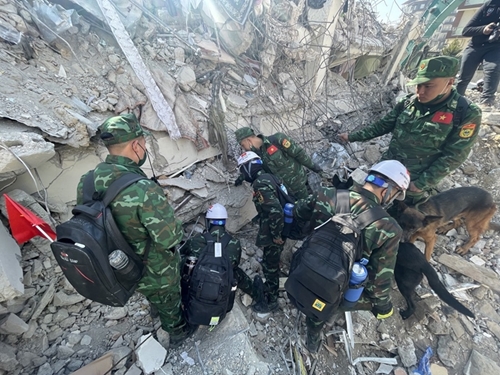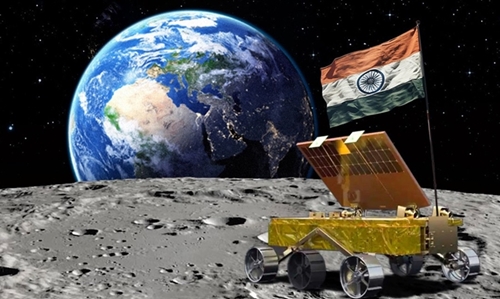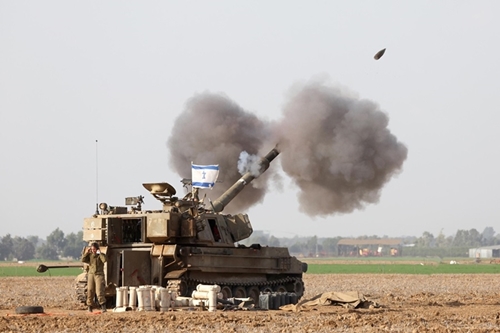1. Progress in climate change mitigation
The 28th Conference of the Parties to the United Nations Framework Convention on Climate Change (COP28) in the United Arab Emirates made a significant step by endorsing a historic agreement calling for fair, orderly, and reasonable transition from fossil fuels to a target of net-zero emissions by 2050. However, consensus on sustainable alternative energy sources and financial contributions to aid developing countries in transitioning to environmentally friendly energy remains unresolved.
    |
 |
|
Environmental activists calling for climate change action in Dubai, UAE, during the COP28 conference (Photo: The Independent) |
2. U.S.-China reconciliation
Hopes for improved U.S.-China relations emerged after U.S. President Joe Biden met with Chinese Party General Secretary and President Xi Jinping on the sidelines of the G20 Summit in Indonesia at the end of 2022. However, following the U.S. downing of a Chinese drone in February 2023, relations between Washington and Beijing visibly deteriorated. Efforts from both sides in the later half of 2023 helped mend bilateral relations. The summit between Joe Biden and Xi Jinping in November on the sidelines of the Asia-Pacific Economic Cooperation (APEC) week in San Francisco, California, eased tensions and promised to advance global cooperation on various issues.
    |
 |
|
U.S. President Joe Biden and Chinese Party General Secretary and President Xi Jinping in a sideline dialogue at the APEC High-Level Week in San Francisco, California (USA) (Photo: Xinhua) |
3. Stalemate of the conflict in Ukraine
Ukraine's counterattack on all fronts since June 2023 yielded no breakthroughs. Prolonged conflict, coupled with the impact of the Israel-Hamas conflict and impending elections in the U.S. and Europe, led to dwindling financial and military support for Ukraine. A feasible solution to the conflict between Russia and Ukraine remains elusive as peace negotiations are disregarded.
    |
 |
|
Russian soldiers patrolling the streets in the city of Mariupol, Ukraine (Photo: Getty Images) |
4. Devastating earthquake in Turkey and Syria
A severe 7.8 magnitude earthquake on February 6 hit the Southern region of Turkey and Northwestern Syria, resulting in over 67,000 casualties. This is the most severe natural disaster in Turkey since 1993. Several countries, including Vietnam, sent humanitarian aid and rescue teams to assist in Turkey's earthquake recovery efforts.
    |
 |
|
The rescue team of the Vietnam People's Army searching for earthquake victims in Hatay province, Turkey (Photo: Pham Hieu) |
5. Unrest in Africa due to military coups
Military coups in Niger and Gabon in July 2023, carried out by military officers citing dissatisfaction with the political and economic situations, intensified instability in Africa. Since 2020, there have been seven coups in the sub-Saharan African region, causing severe political instability, prolonged issues such as poverty, and societal inequality."
    |
 |
|
Citizens of the capital city of Niamey, Niger, marching in support of the military coup in July 2023 (Photo: AFP) |
6. Rise of Artificial Intelligence (AI)
Several new AI platforms emerged in 2023, bringing changes to various aspects of social life. The robust development of AI, however, raised concerns about its negative aspects such as copyright issues, security threats, fraud, and even humanitarian organizations expressing deep concerns about AI's application in autonomous weapon systems. While acknowledging the positive aspects of AI, some countries and regions have implemented legal frameworks to regulate this promising yet potentially risky field.
7. Space becomes more active
The efforts of nations in space exploration were enhanced in 2023. On August 11, Russia launched the Luna-25 spacecraft, resuming the mission to explore the Moon after nearly 50 years. Shortly after Russia's unsuccessful launch due to Luna-25's deviation from orbit, India made history by becoming the first country to land a probe in the Southern polar region of the Moon. Two weeks later, India announced the initiation of a Sun research mission. Furthermore, on September 7, Japan launched an intelligent exploration spacecraft and it is set to land on the Moon in February 2024. The U.S. aimed to send astronauts back to the Moon by 2025, while China announced plans to land astronauts on the Moon within this decade.
    |
 |
|
India is the first country to land a probe in the Southern polar of the Moon. (Graphic image by Showmetech) |
8. Slow global economic recovery
Influenced by the COVID-19 pandemic, natural disasters, armed conflicts, economic competition, and various other factors, the global economy's recovery was sluggish. The Organization for Economic Co-operation and Development (OECD) estimated a 2.9% growth in the global economy in 2023, lower than the 3.3% of the previous year, and anticipated it to reach only about 2.7% in 2024.
    |
 |
|
Workers at the Mitsubishi electric vehicle manufacturing factory in Kurashiki city, Japan (Photo: Reuters) |
9. India becomes the most populous country
According to the United Nations statistics in 2023, India is estimated to have 1.4286 billion people, surpassing China's 1.4257 billion. India officially became the most populous country globally, a position held by China for over a century. It is likely that India will remain the most populous nation in the world in the long run, as forecasts suggest that by the mid-century, China's population will decrease by 100 million while India's will increase by around 300 million.
10. Israel-Hamas conflict
On October 7, the Islamic Resistance Movement (Hamas) from the Gaza Strip launched a significant attack on multiple areas in Israel. Around 1,400 Israelis lost their lives, and nearly 300 were taken hostage. Israel promptly declared a state of war, launching attacks in the Northern and central parts of the Gaza Strip to suppress Hamas. According to Gaza's health authorities, over 21,000 Palestinians have died, and approximately 55,000 have been injured in Israel's attacks. The humanitarian catastrophe in Gaza is considered the most severe of the 21st century.
    |
 |
|
Israeli military launching airstrikes on targets in the Gaza Strip (Photo: AFP) |
Translated by Trung Thanh